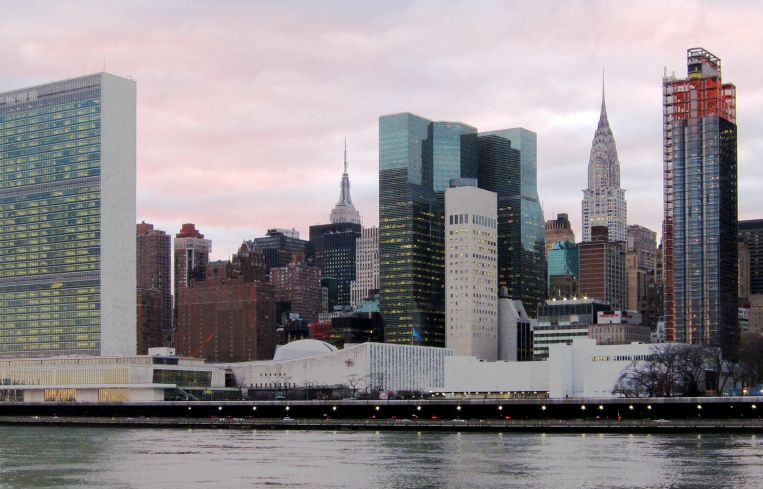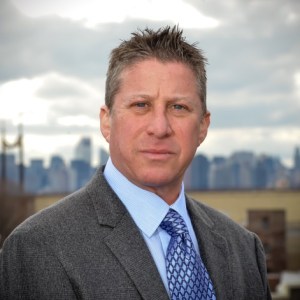When Trump Is the Least of Your Headaches
Talking security measures at Turtle Bay embassies and consulates when the UN is in session with Metropolitan Pacific Properties’ Steven Osman
By Rebecca Baird-Remba September 20, 2017 5:41 pm
reprints
As President Donald Trump and hundreds of foreign dignitaries arrived last Sunday night for this week’s U.N. General Assembly, police officers began to flood the streets of Midtown East. Meanwhile, embassies and consulates were beefing up their own security.
Steven Osman, who manages more than 30 embassies and consulates as head of Metropolitan Pacific Properties, said that Trump is the least of his security concerns, because the president comes with his own Secret Service detail. His 35-person team uses security cameras, private security guards and security details from the New York Police Department and the Federal Bureau of Investigation to help safeguard foreign countries’ buildings. Commercial Observer spoke with Osman to talk about how he’s handling the chaos of this week, which ranges from run-of-the-mill protests to potential terrorist threats.

Who’s got the craziest security? What can you tell us about it?
They’re all pretty tight right now. We don’t manage Israel but they have the tightest security. They have police in front of their building all the time. We’re on alert all the time, but especially this week. The president doesn’t really have an effect on us security-wise; he’s a self-contained unit.
The president of Portugal is in town, and he’s in [one of] our building[s], so he’s more of a concern. We’re concerned with the foreign dignitaries coming in. We get a list a week before of what foreign dignitaries are coming in so we can take precautions with the police and private security so we have everything covered.
Where do most of them stay?
[The foreign countries] all own townhouses or houses out on Long Island, [N.Y.]. We manage an African nation, and they have several private houses they own, in Great Neck and Scarsdale [both in New York]. The Russian one is called Killingworth; it’s a mansion in Glen Cove.
What’s the general MO regarding countries that have a lot of unhappy refugees in New York City?
We really don’t get involved in the politics at all. It’s more about the operation. We rarely engage in any political conversation. It’s more about running their properties and cutting costs where we can. The average country has 300 embassies around the world, and it’s a huge cash drain, but you need to have them.
Trump has a residential building, Trump World Tower, in Turtle Bay. Did you ever work there?
We don’t do any business with Donald Trump. I know him, but we don’t do any business with him. I’ve been to social events in his apartment but nothing in the last five years.
What do landlords in the area of the U.N. usually complain about, security-wise?
Security is very tight around there, so the landlords don’t have much to complain about. Other than Times Square, the U.N. area has the tightest security. And I’m not just talking about the U.N. but thousands of buildings around it. We know the flow of our buildings, so anything out of order, we’re gonna know.
What security concerns do you have for this week?
Any sort of terrorist act. Any sort of outburst. Anything that comes our way unexpected. But there’s not much that we don’t expect. [The consulates are] not issuing any visas this week. I’d assume that most countries aren’t letting the public into their consulates this week.
Are you taking any special security measures?
This week it’s only essential staff.
Some of the [measures] are people; some are additional cameras. We can view our lobbies on our cell phones. We’re in constant contact with the concierges and security. There are no security changes during this time. If someone calls in sick, we need to hear it from someone at the guard company that we personally know.
No food deliveries this week. Because you don’t know who these food delivery people are and you don’t know what they’re carrying in their packages. The police have their hercules unit that’s circling the U.N. area, and they’re heavily armed and available in like five seconds.
Day to day, what do you do to make buildings safe?
My day starts at 7. And at that point I’m in touch with different security officers. If we saw anything on the news, we’ll call people in the [NYPD] counter-terrorism task force, and they’ll have the police in the black uniforms. Even if it’s a threat on someone in D.C., they’ll cover New York. We get cell phone alerts for certain countries and international clients we’re monitoring constantly [in terms of security threats]. We pay a fee for an external service that monitors threats for our clients.
There are armed guards, there are police, there’s concierge. We know who belongs in the building. And when someone is coming for a visa, the country that they’re coming to is called and they’re ID’d. The only time outsiders come to these consulates is for a visa. And depending what country they’re going to, they may be searched for weapons.
What countries do you handle security for?
We do Saudi Arabia, Bahrain, Jordan, Morocco, Portugal, Ethiopia, Greece, Tanzania as well as 22 other countries. About 30 to 35, roughly. We do building [maintenance] employees, security, finances of the building. We do all purchasing. Their internal employees are employed by their countries.
We manage purchasing, labor, electric—we manage everything. It’s a very difficult to break into; it took us over 10 years. There’s a lot of levels that you have to pass through. We have staff that speak many different languages. It’s very evolved; it’s not your normal property management.

![Spanish-language social distancing safety sticker on a concrete footpath stating 'Espere aquí' [Wait here]](https://commercialobserver.com/wp-content/uploads/sites/3/2026/02/footprints-RF-GettyImages-1291244648-WEB.jpg?quality=80&w=355&h=285&crop=1)

